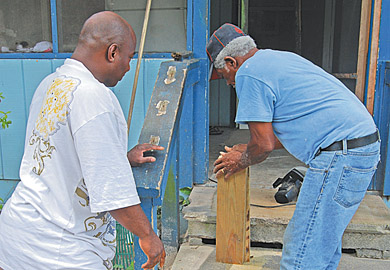L-R: Clarence Lofton and father-in-law Eugene Wright make repairs to Lofton's home in the Douglass Neighborhood.
Within the historical core of the city, in a neighborhood scattered with empty lots and condemned structures, there are still people who can remember when it was a thriving community; full of opportunity and promise.
In the 1960s and 70s, the Douglass Neighborhood was a modest but prosperous pocket of life in southeast High Springs. Like most of the city, it was founded on jobs and commerce fueled by the railroad.
It was also home to the Douglass School, an African-American facility that opened its doors before the passage of the Civil Rights Act of 1964, which would never see the day of integration.
Development came to a halt in the 70s when new Health Department regulations for septic systems made it impossible to build on the small lots in the neighborhood, and the school closed.
Today the area stands in disrepair and is plagued by crime.
John Dewar, a member of the Housing Needs and Improvements Committee, doesn’t live directly in the neighborhood anymore, but he owns property there. The school will never come back, he said, no matter what you do. But the idea is to make the community as close as it can be to what it once was.
At a July 8 meeting, the High Springs City Commission unanimously voted in favor of adopting an ordinance rezoning the Douglass Neighborhood as a “Planned Unit Development.”
This was the first major step toward implementing a revitalization plan more than two years in the works, but there are still bumps in the road toward development.
Beginning in 2009, the neighborhood has been put on the city’s sewer system, and the city amended its zoning requirements to once again allow for smaller lot sizes, as septic regulations would no longer be an issue.
In addition to changing the official zoning of the area to allow for development, the commission also approved preliminary plans for the development that residents hope will take place.
City planner Christian Popoli laid out extensive details about the types of housing and businesses that will be allowed, community facilities, as well as sidewalks, entrance signage and the overall aesthetic design.
The city Plan Board worked together with the Housing Needs and Improvements Committee to get input from the community and put this plan together.
The plan explicitly prohibits mobile homes, and at the suggestion of Mayor Bill Coughlin, will be amended to prohibit pawnshops and check-cashing type businesses.
But there was one provision that raised a point of contention with the commission and is apparently a source of controversy within the community, plan board and committee, too.
The Douglass Neighborhood Plan forbids any type of food or beverage vendor from setting up shop in the community. That means no convenience stores, no grocery stores and no restaurants.
Commissioner John Hill expressed a concern that having a local store of some sort within the community is part of what will create that “neighborhood feel.” Shouldn’t they have somewhere, he asked, within walking distance, where they can buy their milk or eggs?
Furthermore, Commissioner Eric May raised the question of how a ban on these businesses could impede growth. He said grocery stores and restaurants are exactly the kind of businesses needed to start and support a self-sustaining micro-economy, such as is desired for the Douglass Neighborhood.
Chairman of the Housing Needs and Improvements Committee, Jessica Hall, lives in a different area in High Springs now, but she grew up in the neighborhood.
“We want businesses, but what we don’t want is the alcohol and the beer.”
Because the city cannot dictate what a business can or cannot sell on a case-by-case basis, it could not ban alcohol sales specifically within the Douglas Neighborhood. So instead, because the community adamantly opposes making alcohol available within its boundaries, the plan forbids any business that would typically sell beer, wine or liquor.
Hall said that many people who own property there want to start small businesses to serve the community.
Hall said she’d like to open a food establishment and she wouldn’t sell alcohol, but that doesn’t mean others won’t. People get greedy; if there’s more money to be made by selling alcohol, she said, somebody’s bound to do it if they can.
But the commission questioned whether there is a guarantee that no one will be able to sell alcohol, because non-traditional outlets can sell it if they so choose.
Commissioners pointed out examples of barbershops that sell beer and even a surf shop in St. Augustine that sells beer as well.
Because it wasn’t immediately clear what the law actually states, the commission decided to have the city attorney research the matter, and depending on what he finds, the plan could be revised.
Hall said she hopes there is a way to allow for food sales while still controlling alcohol sales.
But Dewar stressed the importance of ensuring successful economic development.
“The community, as it is now, shouldn’t worry about what business is coming in and what they may or may not sell. They should worry about the unlicensed ones there now that sell liquor, beer, sandwiches and everything else.”
Everyone did agree that the plan, as a whole, should move forward.
Douglass Neighborhood inching toward rebirth
Tools
Typography
- Font Size
- Default
- Reading Mode


